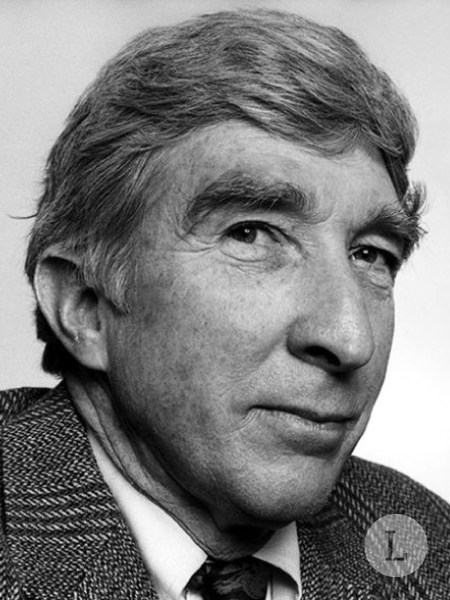
born: MARCH 18, 1932
died: JANUARY 27, 2009
nationality: AMERICAN
movement: REALISM
John Updike (1932-2009) was an American novelist, short story writer, and poet, best known for his Rabbit series of novels and his precise, descriptive prose. Over the course of his career, Updike received numerous awards, including two Pulitzer Prizes for Fiction.
EARLY LIFE AND EDUCATION
Born on March 18, 1932, in Reading, Pennsylvania, John Hoyer Updike grew up in the nearby town of Shillington. His father, Wesley, was a high school teacher, while his mother, Linda, was an aspiring writer who encouraged her son’s literary interests.
Updike attended Shillington High School, where he excelled academically and contributed to the school newspaper. He earned a full scholarship to Harvard University, where he studied English and graduated summa cum laude in 1954. While at Harvard, Updike contributed to the Harvard Lampoon, the university’s renowned humor magazine.
After graduating from Harvard, Updike attended the Ruskin School of Drawing and Fine Art in Oxford, England, for a year on a Knox Fellowship.
CAREER AND LITERARY SUCCESS
John Updike’s professional writing career began in 1955 when he joined The New Yorker as a staff writer. His first novel, The Poorhouse Fair, was published in 1959. However, it was his Rabbit series, starting with Rabbit, Run in 1960, that catapulted him to literary fame.
Throughout his career, Updike authored over 60 books, including novels, short story collections, poetry, essays, and criticism. His works often explored themes of American identity, sexuality, and religion.
TOP 10 BOOKS BY JOHN UPDIKE
Rabbit, Run (1960)
This first installment in the Rabbit series introduces the character of Harry Rabbit Angstrom, a former high school basketball star struggling to find meaning and happiness in his adult life.
Rabbit Redux (1971)
The second novel in the Rabbit series, it continues the story of Harry Angstrom as he faces the challenges of middle age during the turbulent 1960s.
Rabbit Is Rich (1981)
Harry Angstrom returns in the third installment of the series, now a successful businessman navigating the complexities of family life and the changing American landscape of the late 1970s.
Rabbit at Rest (1990)
The final chapter in the Rabbit series, this novel follows an aging Harry Angstrom as he confronts his mortality and reflects on his life.
The Centaur (1963)
A novel blending myth and reality, it tells the story of a high school teacher who imagines himself as Chiron, the mythological centaur, while dealing with the trials of everyday life.
Couples (1968)
This provocative novel explores the intimate relationships and sexual encounters of ten suburban couples in the 1960s.
The Witches of Eastwick (1984)
A dark comedy about three divorced women in a small Rhode Island town who develop supernatural powers and attract the attention of a mysterious, malevolent figure.
Roger’s Version (1986)
A novel delving into themes of faith, doubt, and the complexity of human relationships, centering on a theology professor and his interactions with a computer scientist determined to prove the existence of God through computer algorithms.
Terrorist (2006)
Updike’s exploration of post-9/11 America, this novel follows the story of an American-born Muslim teenager who becomes radicalized and plots a terrorist attack.
The Maples Stories (1979)
A collection of short stories, initially published in The New Yorker, that chronicles the evolving relationship and eventual dissolution of the marriage of Richard and Joan Maple.
INTERESTING FACTS
- Updike was an avid art enthusiast and talented amateur artist. His works have been exhibited in several galleries.
- He was known for his unique writing routine, working from 8:30 AM to 4:30 PM every day and producing at least three pages of polished prose.
- Updike had an intense fear of death, which influenced many of his works, particularly the Rabbit series.
- He was a devout Christian and frequently explored themes of faith and spirituality in his writing.
- Updike’s mother, Linda, was a writer herself and had a significant influence on his literary aspirations.
AWARDS AND HONORS
Throughout his career, Updike received numerous awards and honors for his contributions to literature, including:
- Two Pulitzer Prizes for Fiction, for Rabbit Is Rich (1982) and Rabbit at Rest (1991)
- The National Book Award for Fiction for The Centaur (1964)
- The PEN/Faulkner Award for Fiction for Rabbit at Rest (1991)
- The National Medal of Arts (1989)
- The Rea Award for the Short Story (1996)
- The PEN/Malamud Award for Excellence in the Short Story (1988)
DEATH AND LEGACY
John Updike passed away on January 27, 2009, after a battle with lung cancer. He was 76 years old. His rich and varied body of work has left a lasting impact on American literature, with the Rabbit series, in particular, standing as a masterful examination of American life and culture in the second half of the 20th century.
